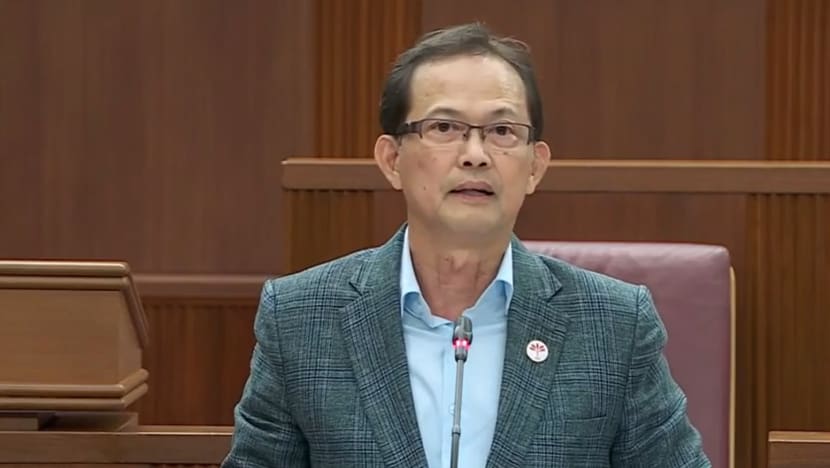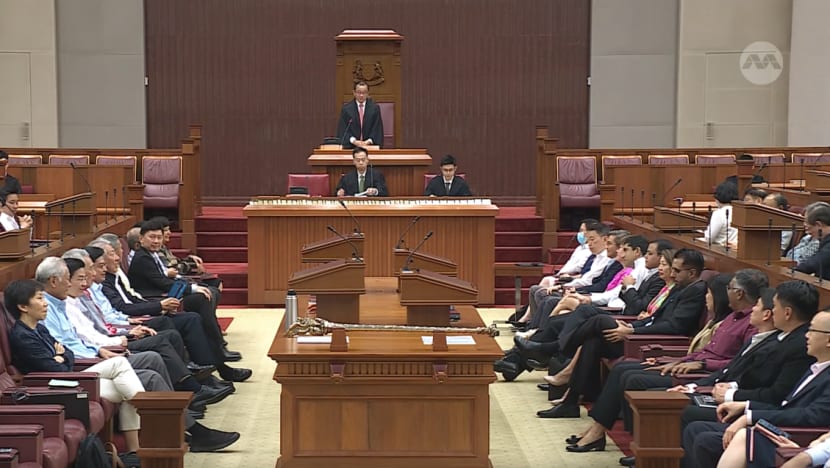'I've called on people fairly and consistently': Singapore's Speaker of Parliament Seah Kian Peng
The MP for Marine Parade GRC reflects on his first year on the job - and how he's preparing for the Pope's arrival at Parliament House.
.jpg?itok=26Ggl6UU)
Speaker of Parliament Seah Kian Peng standing next to the speaker's chair in the chamber at the Parliament House on Aug 14, 2024. (Photo: CNA/Ili Nadhirah Mansor)

This audio is generated by an AI tool.
SINGAPORE: As Singapore's Speaker of Parliament, Mr Seah Kian Peng believes that he consciously makes an effort to apply the rules and oversee proceedings in an impartial manner.
“So that whoever and whichever party they are from, will feel that ... the way I've chaired, the way I've called on people, I’ve done it fairly and consistently,” he told CNA.
Mr Seah, who is also Member of Parliament (MP) for Marine Parade GRC, marked his first year on the job earlier in August.
And a recent incident involving Non-Constituency MP Leong Mun Wai served to reaffirm Mr Seah's belief that what is said in parliament is "serious business".
Mr Leong, a member of the opposition Progress Singapore Party’s (PSP) central executive committee, had said on a podcast that he was usually “one of the last to be called” to speak in parliament, despite being one of the first to raise his hands.
Though he eventually publicly retracted the comment, Mr Leong’s words had still cast aspersions on the Speaker’s fairness and impartiality, Mr Seah said in a July sitting.
“Anyway, I think he put it on record that, yes, I was fair,” said Mr Seah, 62.
He noted that with over 100 members in the House currently, including non-partisan Nominated MPs, it was only natural for questions to arise over opportunities to speak.
“I was a backbencher before, so I also felt that ‘Speaker how come don't give me time to speak' (feeling),” he said.

INTO THE DEEP END
Mr Seah recalled how he took up the office of the Speaker of Parliament during what he called a "difficult period" for Singapore's political parties.
"That very first day itself, there was a motion that was filed to talk about the impartial role of the Speaker,” he said.
That had been filed by the PSP, after a hot mic incident with former Speaker Tan Chuan-Jin muttering “f****** populist" in response to a speech by opposition MP Jamus Lim.
But before the motion could be debated, Mr Tan resigned over an affair with fellow ruling party MP Cheng Li Hui. Days later, opposition Workers' Party members Leon Perera and Nicole Seah also stepped down over an extramarital affair.
Mr Seah then presided over the debate on the very first day of his job.
He considers it as one defining moment of his tenure thus far, as he was thrown “straight into the deep end” and on "rather short notice".
“One minute you were at the backbench, and then the next minute, you assumed the chair."
STRESSES OF A DIFFERENT KIND
Upon becoming Speaker, Mr Seah stepped down from his role as group CEO of NTUC Enterprise and from the boards of its social enterprises.
He had spent a large part of his career with the labour movement's group of companies, helming different portfolios.
“I freed myself from corporate and commercial stresses, but at the same time, I took on stresses of a different kind,” he said.
One obvious pressure while chairing parliament sittings lies in deciding who to call on to speak, though Mr Seah said “it's not rocket science”.
“If you had spoken on a Bill; obviously if you have clarifications, I should give those who had spoken the first right. Those who did not speak, but subsequently have a point of view, yes, but they will be second order."
The same goes for parliamentary questions, where time is of the essence with an allocated duration of 90 minutes.
“You also want to make sure that you move things along,” said Mr Seah, adding that he cuts in when necessary, and for members on both sides of the House, regardless of party affiliation.
With a general election on the horizon, Mr Seah said members should be mindful about not using parliament as part of "electioneering".
"If it is against the standing orders, I will call them out.”

"A BIT MORE HEATED UP"
Mr Seah, who first entered politics in 2006, has for nearly two decades observed changes brought about by the increased opposition presence in the House.
“There is probably more contestation. And I guess sometimes some debates get a bit more heated up,” he said.
With a rise also in the overall number of MPs, more parliamentary questions and more adjournment motions are being filed for each sitting, he added.
“The last sitting, we had five members who wanted to file adjournment motions. But we had a two-day sitting, so obviously only two of them could speak. There are also more private members bills as well,” said Mr Seah.
He traced this partly to MPs now having “stronger convictions” on certain issues.
These days, Mr Seah also has his hands full overseeing events and ceremonies by the President's Office - some of which are now held at Parliament House due to the Istana undergoing major renovations.
This arrangement was first activated when Laos Prime Minister Sonexay Siphandone paid a maiden official visit in July, with a military guard of honour welcoming him at Parliament House.
Mr Seah's team has been busy preparing for more upcoming events - one of which will involve Pope Francis during his Singapore visit in September.
“The Pope will be received here. It actually is going to happen in a week where we have parliament sitting. So what I have done is to move the sitting, just shift a little bit, a day earlier, to accommodate this,” said Mr Seah.
“We want to make sure that it's a success, and we'll do our part.”














